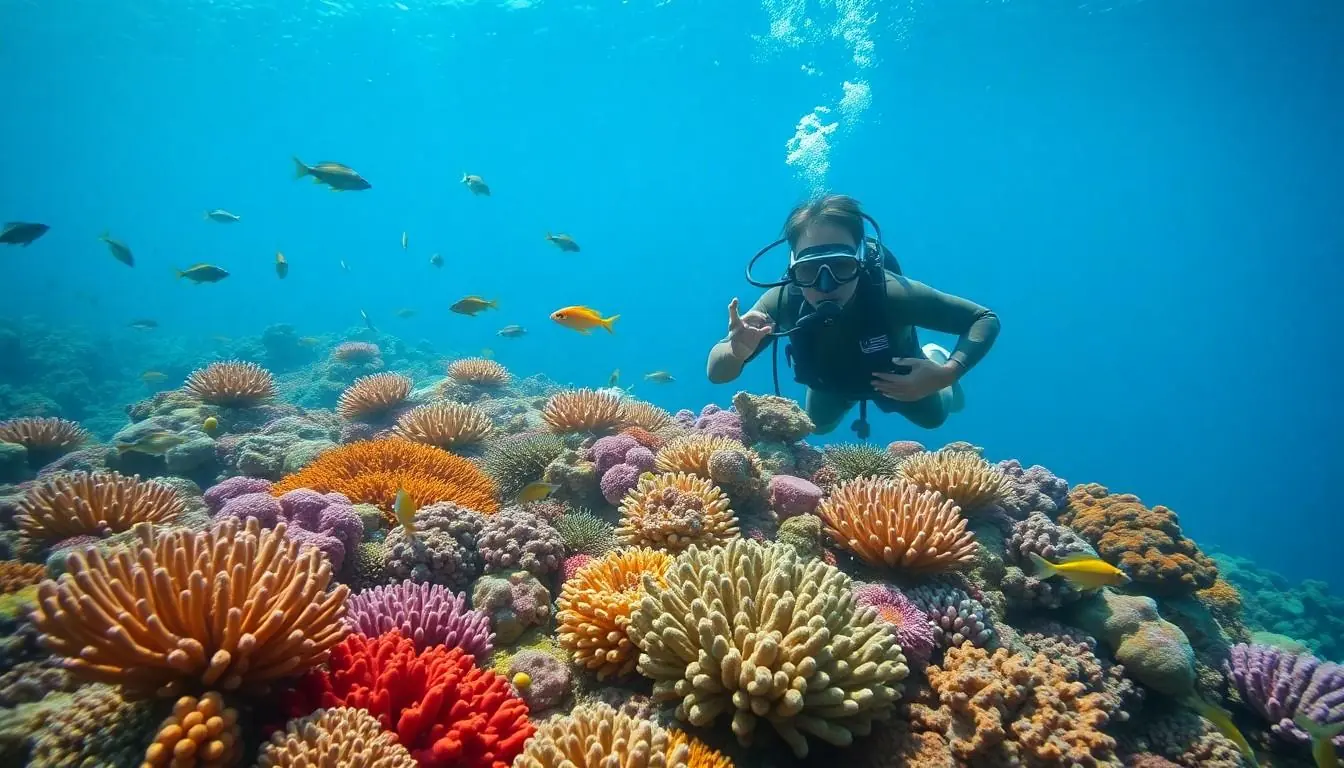Coral reefs are like the colorful underwater cities of the ocean, bustling with life and beauty. Yet, despite their vibrant charm, they’re facing a crisis that even the best legislation seems to ignore. It’s as if lawmakers are trying to save a sinking ship with a leaky bucket. With coral reefs disappearing faster than socks in a dryer, one has to wonder: are our laws just a fancy way of saying, “We tried”?
Despite the good intentions behind various regulations, the results often resemble a half-baked casserole—lots of promise but lacking the crucial ingredients for success. From pollution to climate change, these underwater wonders need more than just a pat on the back from policymakers. They need action that actually works. So, let’s dive deeper into why legislation has flopped in its mission to save the reefs and what can be done to turn the tide.
Table of Contents
ToggleOverview of Coral Reef Legislation
Legislation aimed at preserving coral reefs includes a variety of national and international laws designed to protect marine habitats. The Coral Triangle Initiative, established in 2009, targets biodiversity conservation in one of the richest marine areas globally, focusing on Indonesia, Malaysia, and Papua New Guinea. The US also has significant legislation, such as the Coral Reef Conservation Act of 2000, which seeks to enhance the protection of coral ecosystems.
In many instances, enforcement of these laws proves ineffective. Many countries lack the necessary resources and infrastructure to implement regulations effectively. Local governments struggle with insufficient funding and expertise, restricting their ability to monitor and protect coral reefs adequately.
Claims of success often lead to complacency, with governments declaring their efforts sufficient despite ongoing decline. Reports from organizations like the National Oceanic and Atmospheric Administration (NOAA) show that coral cover continues to decrease, highlighting inadequacies in current regulations. Regulatory frameworks often fail to incorporate scientific data on climate change and pollution impacts, allowing harmful practices to persist.
Prioritizing comprehensive strategies could enhance outcomes. Observations indicate that more integrated approaches combining legislation with direct community engagement yield better results. Regional agreements, such as those developed by the Caribbean Community (CARICOM), promote sustainable practices and empower local stakeholders.
Monitoring programs support these efforts by providing data on coral health, thus informing policy adjustments. Protecting coral reefs requires dynamic, adaptable measures that respond to evolving threats, rather than static laws that do not evolve with emerging challenges. Collaboration among nations, communities, and scientists ensures sustained efforts in preserving these vital ecosystems.
Key Factors Contributing to Ineffectiveness

Coral reef preservation laws often fail due to several interconnected issues. Understanding these factors sheds light on the challenges remaining in effective legislation.
Lack of Enforcement
Enforcement of existing coral reef protection laws frequently lacks rigor. Authorities often possess insufficient resources, leading to minimal oversight of harmful activities. Many countries struggle with inadequate training for enforcement personnel, further weakening the impact of regulations. As a result, illegal fishing and destructive tourism practices continue unchecked in sensitive areas. Organizations like NOAA report declines in coral cover, indicating that enforcement gaps significantly impair efforts to safeguard marine ecosystems.
Inadequate Funding
Funding allocated for coral reef conservation often falls short of necessary levels. Legislative initiatives may exist, yet they typically lack financial backing for implementation. Governments frequently prioritize short-term economic gains over long-term ecological health, diverting funds away from conservation projects. Limited financial resources stymie research efforts aimed at assessing reef conditions and developing adaptive management strategies. Consequently, crucial programs designed to protect coral reefs cannot function effectively without robust and sustained investment.
Policy Gaps
Essential policy gaps plague current legislation designed to protect coral reefs. Many regulatory frameworks overlook critical threats, including climate change and pollution. As a result, existing laws often do not address factors that contribute to coral degradation comprehensively. Inconsistent policies across regions can lead to confusion and ineffective responses to coral reef crises. Moreover, inadequate integration of scientific data into these policies allows detrimental practices to persist unchallenged, further jeopardizing the survival of these vital ecosystems.
Case Studies of Failed Legislation
Numerous instances illustrate the ineffectiveness of legislation aimed at preserving coral reefs. These examples reveal critical shortcomings in policy enforcement and execution.
Example 1: Coral Reef Conservation Act of 2000
The Coral Reef Conservation Act of 2000 aimed to promote the protection and management of coral reefs in the United States. Funding allocated through this act often fell short, restricting necessary conservation programs. Many states lacked sufficient resources to enforce its provisions effectively. Consequently, illegal fishing and destructive tourism practices continued to damage reef ecosystems. NOAA reports highlighted ongoing declines in coral coverage, undermining the act’s intended outcomes.
Example 2: Coral Triangle Initiative
The Coral Triangle Initiative focuses on protecting marine biodiversity across six Southeast Asian countries. Despite its well-meaning goals, implementation has encountered significant roadblocks. Many member nations struggle with inadequate enforcement capacity, leaving regulations unenforced. Environmental degradation persists from coastal development and pollution, exacerbated by weak governance. Monitoring efforts often fail to deliver necessary data for informed policy adjustments. Repeatedly, the Coral Triangle Initiative illustrates how ambitious legislation can falter without effective cooperation and resources.
Alternative Approaches to Coral Reef Preservation
Existing legislation often fails to protect coral reefs effectively. Alternative approaches can offer innovative solutions to this pressing issue.
Community-Led Initiatives
Community-led initiatives play a pivotal role in coral reef preservation. Local groups often engage in restoration projects that bolster coral health and biodiversity. Marine protected areas benefit from community involvement, leading to improved monitoring and enforcement of regulations. Participation fosters stewardship, as residents develop a personal connection to the ecosystems. Grassroots efforts also empower communities to advocate for sustainable practices and cleaner environments. Evidence shows that initiatives driven by local knowledge lead to successful outcomes in coral management.
Scientific Innovations
Scientific innovations contribute significantly to coral reef preservation efforts. New technologies, such as genetic engineering, aim to enhance coral resilience against climate change effects. Scientists are also exploring coral farming methods to restore degraded areas efficiently. Monitoring technology, like underwater drones, allows for precise data collection on reef health. Data derived from these innovations informs policy adjustments and conservation strategies. Collaborative research initiatives enhance understanding of coral ecosystems, promoting informed decision-making among stakeholders. Effective scientific advancements inspire hope for more resilient coral reefs in the future.
The ongoing decline of coral reefs highlights the urgent need for a reevaluation of current legislative efforts. Existing laws often lack the necessary enforcement and funding to make a meaningful impact. Without addressing the root causes of degradation such as pollution and climate change, these measures can appear more symbolic than substantive.
To truly safeguard these vital ecosystems, a shift toward comprehensive strategies that involve community engagement and innovative scientific approaches is essential. By fostering collaboration among nations and empowering local initiatives, it’s possible to create a more effective framework for coral reef preservation. The time for action is now, as the health of our oceans depends on it.




